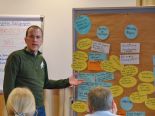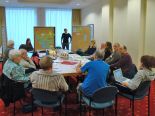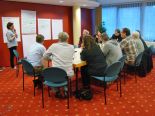Citizen's jury „Climate Engineering – an oppurtunity against climate change?“
The DFG project TOMACE organized a citizen’s jury to discuss issues of climate engineering
From January until March 2018 a citizen’s jury took place in Schwerin. The organizers invited twenty-five citizens of Germany to discuss during the course of three weekends different issues concerning the climate engineering technologies Stratospheric Aerosol Injection (SAI) and Bioenergy with Carbon Capture and Storage (BECCS). Within a citizen’s jury critical reflection and discussion as well as enabling people to argue for their own point of view is intended.
At the end a short report is written by the participants. The report will be given to policy makers or scientific policy advisers as well as to the broader scientific community to show how citizens for example of a certain country think about issues regarding climate engineering.
For the selection of participants the organizational team worked together with the UZ Bonn which does empirical social research. The institute had chosen people randomly by telephone calls. Of course, a heterogeneous group of people regarding age, gender and education was intended. However, a citizen’s jury is not representative. Rather, its strength lies in the opportunity for lay persons to learn, to discuss and to reflect in detail important political issues, in our case climate engineering in the context of climate change.
The research interest of TOMACE lies in how lay persons perceive SAI and BECCS in the context of climate change: For example, do people have reasons to argue in favor of one technology while rejecting the research or implementation regarding another one? Do they think that SAI should be researched because it is less harmful than the impacts of climate change? What arguments do they have for their own position and is there a common position regarding the assessment of SAI and BECCS? How do they perceive climate change in general and does this perception influence their opinion on climate engineering technologies?
During the first weekend which took place from the 19th until the 21th of January, participants received much and diverse information about the issues which are to be discussed. Therefore, participants got informed about climate change, climate policies, the ethics of climate engineering as well as about economic and technological issues regarding SAI and BECCS. Therefore, experts from natural and social sciences gave presentations and answered questions.
During the second weekend which took place from the 16th until the 18th of February, the participants worked in small groups. They were supported by professional moderation as well as project members of TOMACE. Because the aim of a citizen’s jury is that the participants write a report on for example climate engineering, participants had to identify central themes which they think are important to consider regarding climate change as well as SAI and BECCS. The citizen’s jury split up in two groups, one smaller group of 8 people for discussions on SAI and one larger group of 14 people for the analyses of BECCS. They separately worked in their groups but were asked to present and discuss their working group results with the others at various times during the weekend. At the end of the second weekend the participants had a preliminary structure and focus for their report.
The last weekend took place from the 16th until the 18th of March. Within small working groups the participants mainly wrote their common point of view. During the second weekend members of the project team as well as professional moderation supported the group processes. On Sunday afternoon seventeen participants passed a report consensually. Three of the main results from the report are the following:
- All participants stated, that strong mitigation and negative emissions are a necessity and should be given priority over climate engineering technologies such as SAI.
- The implementation of SAI was rejected. Some of the participants added, that it might function as a last resort.
- Both technologies, SAI as well as BECCS, should be researched more thoroughly. This for example also includes research on possibilities to render SAI ineffective.
Download the complete report (German) here:















